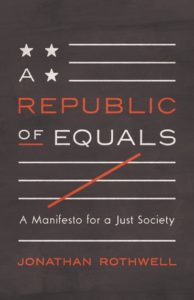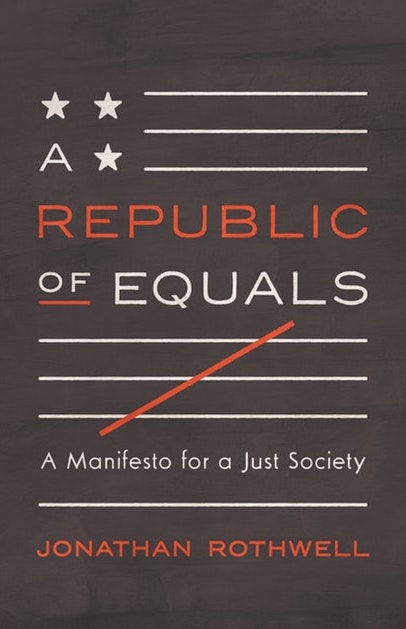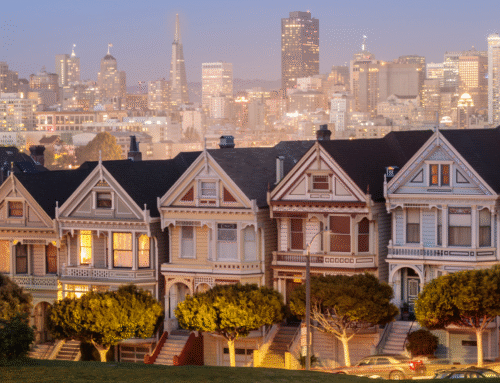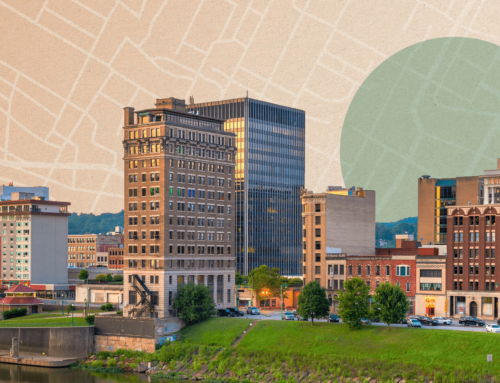This article is the third installment of EIG’s Author Series, in which we invite experts from diverse backgrounds and across the ideological spectrum to explore policy issues and ideas. Here, Jonathan Rothwell, Principal Economist at Gallup and visiting scholar at George Washington University discusses his new book, A Republic of Equals: A Manifesto for a Just Society.
Note: The views below do not necessarily reflect the position of EIG.

Q: What’s your vision of a Republic of Equals?
A: I want a politically equal society, where basic liberties are guaranteed, public goods and services are provided equitably to all, the poor and disabled are cared for, and markets are open and accessible. I believe that arrangement would lead to a far more equitable distribution of income than we currently have in the United States.
Q: Market egalitarianism might be the most important concept in your book. Unpack that for the lay person.
A: I believe access to markets has been a much-neglected aspect of political rights. It should be up there with voting and free speech. Take the Jim Crow system. It held down the social status of black people not only by suppressing their vote. It deprived them of participation in almost every market. In the labor market, professional occupations were closed off to black people. In financial services, lending was unavailable in black neighborhoods. In higher education services, many colleges refused to admit black students. In all these cases, black people were willing and able to pay. The market was closed off.
Today, markets are still closed in many ways. Zoning laws eliminate markets for would-be buyers or renters of higher density housing, and the market for professional services is closed as a result of overly stringent licensing regulations.
One of the main points of the book is that people have the natural talent to contribute productively to society in many different ways. Allowing everyone to participate equally in markets would reduce inequality by limiting the gratuitous earnings flowing to privileged elites and raise the earnings of ordinary people.
Q: Is it fair to say that equality of opportunity is the broken promise at the heart of your manifesto?
A: Well, equality of opportunity figures prominently in the book. I try to emphasize that in a politically equal country (which a republic or democracy is supposed to be), equality of opportunity does not mean that everyone should have the same genes, parental upbringing, and experiences. Rather, it means that the public goods and services that we have decided are important (like security and education) should actually be given out equitably. The fact that poor black and Hispanic children tend to get stuck with lower performing teachers because they live in segregated neighborhoods is completely at odds with any meaningful conception of political equality. We need to think more seriously about both desegregation and the expansion of high-quality learning experiences inside and outside the school system.
Q: In the book you call out many of the most pedigreed among us for having bought into an ultimately self-serving narrative that their own genius and hard work justify high levels of inequality, when in fact many are beneficiaries of a rigged system. What’s unmeritocratic about the meritocracy today?
A: Some aspects of success are warranted. For example, I discuss evidence that pay is linked to performance in many companies—especially large, professionally run corporations with best-practice management policies. That’s all fine, but what troubles me is how political power has seeped into both the development of talent (e.g. for people who grow up in nice neighborhoods and attend high quality schools) and access and control of markets. If you enter an industry or profession that is highly regulated, such as medicine, law, or finance, chances are your industry association has managed to set up rules that benefit you and other members. Other equally skilled people who don’t enter these professions earn salaries that are close to the market wage, while those in the regulated professions enjoy a massive premium, which is akin to tax revenue paid for by the rest of us.
Q: You build a compelling empirical case that the power amassed by the professional elite is the driving source behind today’s high levels of income inequality, rather than the popular go-to culprits of trade and technology. Why do you think the conventional wisdom is so stubborn in recognizing the facts you lay out so clearly?
A: I believe the reason is that the dominant political narrative of the 20th century has been capitalists versus workers, and that narrative was never quite right, but it is increasingly wrong and unhelpful today. The top 1% are increasingly comprised of owners of S-corporations and other pass-through entities that have very few owners, not big corporations. These owners often take their compensation as workers of their own company. So, empowering “workers” means that they pay themselves even more. On the other side, gig economy workers—who are rarely rich—are usually self-employed business owners, so empowering them means empowering people traditionally deemed “capitalists.” Our political parties and their constituencies have not absorbed these nuances.
Q: You tackle the conventional wisdom again where you dissect the 2016 post-election analyses and find that employment in manufacturing is actually one of the weakest predictors of support for Trump. What else are we misreading about the signals voters sent in that election?
A: The election was about unfairness, not affluence. For several decades, we have experienced declining productivity growth along with rising and high levels of inequality. Most people didn’t get poorer, but others gained at their expense. Populism on the right (which blames foreigners and pro-globalization elites) and populism on the left (which blames corporations) became much more credible under these conditions, and in neither case was the appeal directly tied to grievances delivered by the stated targets of scorn.
Q: Your own analysis of Gallup data found that racial isolation, rather than conscious and overt racism, was the strong predictor of Trump support in the 2016 election. What policy lessons do you draw from that?
A: There is a rich literature in the social science establishing that “contact” between groups reduces prejudice by increasing information. Thus, de-segregation creates a better, more informed citizenry. We know that zoning laws cause segregation and disrupt markets. Let’s reform them.
Q: Your discussion of neighborhoods and housing markets is fascinating and rich with history. Have we physically zoned ourselves into inequality?
A: Yes. It was a very conscious decision to do so. The elites of the 1920s did not want to live near immigrants from Southern or Eastern Europe, nor African-Americans, and they did not want to share political power by living in the same jurisdiction. “Race science” was rampant and horrifically prejudiced at the time. Most people believed that social status was genetically determined, and native white people were at the top. Hence, the United States created a kind of apartheid to segregate elites away from everyone else politically and socially. Black Americans eventually became the most extreme victims of this.
Q: How are housing markets and neighborhood effects working to disadvantage struggling Americans regardless of race?
A: Neighborhoods are the centers of gravity in our social lives. They transmit learning experiences, and culture, while also exposing residents to (or insulating them from) stress, danger, and crime. The research on neighborhood effects has reached new heights of scientific rigor, and it is clearer than ever that neighborhoods matter in many profound ways. Thus, economic segregation is very bad for those who end up in bad neighborhoods.
Q: One of the most jaw-dropping statistics from your book is that the gap in neighborhood quality for the rich and poor in the United States is greater than in Israel, which one might expect to be the outlier given its fraught religious and ethnic divisions. Just how exceptional are U.S. levels of segregation in the developed world? What makes us such an outlier?
A: Comparative segregation is a field that, sadly, has yet to really emerge. It was a challenge pulling that information together, but even from the limited sources that exist—such as the data you mention—it is clear that the United States really does stand out, not just among rich democracies but globally, in terms of how extreme it is in its segregation. From what I learned from the literature and my own work, European countries do not discriminate against the density of housing like the United States does. I believe this is because Europe has centuries of urban life. European cities created the first republican institutions and universities. Dense housing is not associated with low-status people. Unfortunately, when zoning laws emerged in the early 20th century United States, cities and density were seen as threats to health and status, and all of our regulations since then have maintained that fundamental bias.
Q: What are the biggest political barriers to building a Republic of Equals?
A: There are two. The first is that the public and our leaders misunderstand how to get there. That’s why I wrote the book. Secondly, even if people accept my argument, there are local and state associations that control access to markets in housing and professional services. They are extremely powerful, and no organized countervailing forces exist.
Q: Medicare for All, free college, or a wealth tax: which one is the silver bullet?
A: Ha, none of the above.
Q: In all seriousness, let’s take healthcare. What would a reform agenda rooted in market egalitarianism look like?
A: Well, my preferred solution to healthcare is to return to a model that we tried in the early 20th century but was squashed by the American Medical Association: prepaid physician groups. The brilliant thing about this arrangement is that nobody needs insurance. People pay a set fee (and it could be subsidized for the poor by the federal or state government) in exchange for the right to medical services, and perhaps a small co-pay. The doctors (in partnership with other practitioners of medicine) can act as both providers and insurers. This gives them an incentive to provide good services (to attract patients) but contain costs, by forgoing unnecessary procedures and encouraging preventive medicine. In one fell swoop, it would eliminate all of the inefficient paperwork and administrative services that rack up costs now and free up doctors and others to spend real quality time with patients. My healthcare plan would move to this sort of system, while preserving an important federal role of providing universal catastrophic insurance coverage and regulating physician groups.
I’d say we also need to reform pharmaceuticals. The current system overpays for useless drugs. A better system would pay something closer to the marginal costs of production for good drugs that have actually been proven to make a difference in fighting disease.
More generally, we desperately need greater market discipline in healthcare prices.
Q: Let’s talk about occupational licensing too. On the one hand, licenses (and associated requirements and fees) raise the barrier to entry to occupations. Researchers out of MIT recently showed that on the whole they create significant deadweight losses for society and disadvantage the most marginal would-be workers most severely. Yet you see a role for them in furthering equality for women and minorities. Walk us through the complexities here.
A: I think licensing, in general, has a valuable role to play in informing consumers and facilitating mutually beneficial exchange. The problem is that powerful associations have gradually distorted licensing laws to benefit their members at the expense of the public. They have gone too far in creating entry barriers to gain a license and too far in expanding and enforcing their monopoly on the provision of services. The result is that many capable people with lower-status licenses (such as “para-professionals”) are prohibited from performing valuable services that people would gladly pay them for. The effect is that the most over-represented people in the top 1% are doctors, lawyers, and dentists. They, of course, provide valuable services and deserve to be highly compensated, but their political power results in excess compensation.
Q: Is the idea of justice overly politicized today?
A: Superficially I think perhaps, but not under the surface. A fascinating new Gallup research project with the Norwegian School of Economics shows that most people around the world have similar notions about economic fairness. Most people are perfectly happy to pay people extra money when they perform high-quality work, but they do not think people should get paid more in the absence of any meritorious reason.
A related point in my book is that we share a fairly universal human notion of fairness that is grounded in our evolutionary past. It shouldn’t be hard to come up with widely popular policies that make the world more just, as long as we work form the same facts.
Q: This is an inherently optimistic book. What justifies that?
A: My belief in the inherent dignity, rationality, and competence of the human species, and the advantages we have of growing up in a quasi-republic, even a flawed one. Cooperation is baked into our DNA, and the genes associated with success in life are common. In the United States, those traits take shape under what I regard as fundamentally strong institutions. Misinformation has distorted those institutions in the ways I have described, creating the problems we now face, but people can learn and change their minds when confronted with new evidence.





